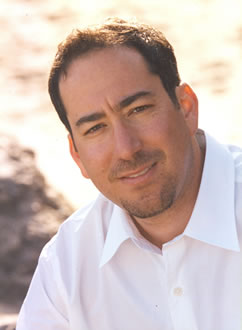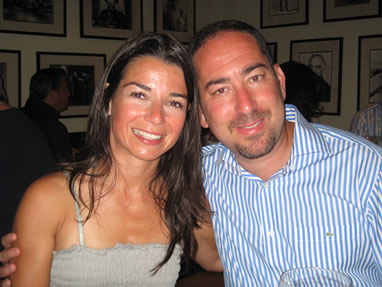 Aaron Broder is the co-founder of Gorilla Nation. He’s working with some sites which do considerable volume, and spends his time putting together branding deals. He has combined his expertise and family background in entertainment to create an online ad rep company for Web publishers. Aaron shares how Gorilla Nation started, how it found its niche with mid-tail sites, and how it plans to grow internationally. Many of us are direct response focused; it’s about time we learned a little about the branding side of things; there’s a lot higher CPM’s in it.
Aaron Broder is the co-founder of Gorilla Nation. He’s working with some sites which do considerable volume, and spends his time putting together branding deals. He has combined his expertise and family background in entertainment to create an online ad rep company for Web publishers. Aaron shares how Gorilla Nation started, how it found its niche with mid-tail sites, and how it plans to grow internationally. Many of us are direct response focused; it’s about time we learned a little about the branding side of things; there’s a lot higher CPM’s in it.| Read Interview | Full Transcript | Download mp3 | Highspeed Mp3 | iTunes |
Personal Info
Hobbies and Interests: Skiing, Movies, College Football, Running, Scuba Diving.
Favourite Sports Teams: LA Lakers, Wisconsin Badgers.
Favourite Books:
- Thrillers
- The Great Gatsby by F. Scott Fitzgerald
- The World Is Flat 3.0: A Brief History of the Twenty-first Century by Thomas L. Friedman
Favourite Entrepreneurs: Steve Jobs, Warren Buffett, Larry Ellison
Company Website: http://www.gorillanation.com
Fast Track Interview
Adrian Bye: I’m talking today with Aaron Broder, who is co-founder and CEO of Gorilla Nation, an online rep firm. Aaron, tell us about yourself and what your company does.
Aaron Broder: My grandfather was a movie producer in the 1940s and 1950s. My family has also had a career in entertainment. I have a CPA, JD, and an MBA. Early on, I realized I wasn’t that interested in entertainment. Instead, I started my first Internet company built around creating an entertainment community site centered on young celebrities. In 1998, I started Celebrity Boulevard with my business partner Brian Fitzgerald.
We quickly realized that business was difficult. We were working with a company that was brokering our ads for our site, Celebrity Boulevard, and they were taking a good commission. We realized our skills were really in the business aspect and not necessarily building a site. We then become more of an ad rep company. That’s how Gorilla Nation started.
Adrian Bye: You’ve been around the entertainment business for a long time. What you’re doing with Gorilla Nation is taking that expertise and bringing it to web publishers?
Aaron Broder: That’s correct. I spent several years around Hollywood agencies, which represent writers, directors, film producers, composers, and editors. Once we had the Celebrity Boulevard model and started talking to ad rep companies, we realized that a media rep was very similar to a Hollywood agency. We’re an agency rep for web publishers.
Around 2001, we switched to repping. At that point, we felt there was a great opportunity to help movies studios connect with audiences online. We signed some of the leading independent movie information sites, such as Rotten Tomatoes which News Corp purchased, Box Office, Mojo, Jo Blo, Dark Horizons, and other sites.
Then we started signing other sites to reach that elusive film fan, such as leading comic sites, anime sites, and scary movie sites, where they can properly market a science fiction thriller across a grouping of science fiction sites and movie sites.
![]() Right now, we’re focused across 37 different verticals. We represent a number of marquee properties, which include Marvel.com, Starwars.com, and some of the aforementioned film sites. We represent a lot of the leading celebrity blog sites, such as TheSuperficial and PinkIsTheNewBlog. We also represent Millsberry, one of the largest children’s sites.
Right now, we’re focused across 37 different verticals. We represent a number of marquee properties, which include Marvel.com, Starwars.com, and some of the aforementioned film sites. We represent a lot of the leading celebrity blog sites, such as TheSuperficial and PinkIsTheNewBlog. We also represent Millsberry, one of the largest children’s sites.
We’re really still entertainment and lifestyle focused, but we do represent a variety of sites in different categories, such as anime comic book, science fiction, and hunting and fishing enthusiasts. We also represent sites in broader categories, such as leading film sites, leading video games sites, news and information sites, leading music sites, and celebrity gossip sites. In addition to those categories, we also represent leading women’s sites, which include general female interest sites, style sites, fashion sites, and sites appealing to celebrity gossip.
Adrian Bye: What kind of annual volume of ad sales are you managing?
Aaron Broder: Our total company’s revenues last year hovered around $47,000,000. Since 2002, we’ve experienced anywhere between 50 to 200 percent growth based on the year. We expect 2008 to continue that trend.
Adrian Bye: Let’s say I have a site and come to you. What would happen?
Aaron Broder: We would discuss the site and agree to a representation contract where we would go out and act as the exclusive premium ad sales entity that would directly replace any internal sales team.
Our direct responsibility would be dealing with brand marketers relevant for the site. We target those marketers through a variety of integrative promotions as well as banner media. In addition to just selling the banners on the site, we sell different ad formats or custom units, such as creating custom advertorial, actually re-skinning the page, or creating very interesting programs that can engage with the reader through vehicles other than just a mere ad. We pitch those programs to marketing partners, and then we agree to rates, the specs, the duration, and the budget of the buy. We end up using our ad server to serve our ads.
Adrian Bye: Does re-brokering happen? Do you go to other agencies and get bigger rates that way?
Aaron Broder: No. We only work directly with our publishers. We could work with a group of people that own more than one site, but we do not work through other brokers. It’s our belief that it’s important to work directly with the publishers. If you’re going to come up with custom programs, you need to work with that very specific person or owner in charge of the site.
Adrian Bye: Let’s say you’re a big publisher, and you’ve been running your inventory yourself. Then you have one of your friends start selling it. You get to a certain scale, and it suddenly starts to make sense to bring him in house again.
 Aaron Broder: It really depends on the individual publisher. A lot of publishers, for example Marvel.com, are owned by parent companies that aren’t advertising focused businesses, such as the revenue they’re generating through their site in comparison to the revenue earning to Starwars.com. What they’re looking to do is have a clean and efficient solution from an outside sales agency.
Aaron Broder: It really depends on the individual publisher. A lot of publishers, for example Marvel.com, are owned by parent companies that aren’t advertising focused businesses, such as the revenue they’re generating through their site in comparison to the revenue earning to Starwars.com. What they’re looking to do is have a clean and efficient solution from an outside sales agency.
A lot of independent publishers also need to have their properties reach the brand equity levels or have the total amount of inventory where it makes sense to bring that in house. If you have a big enough site, you cannot simply service that site by having one sales person. You need to have sales planners, ad traffickers, and multiple sales people. It is difficult to find those people, especially confident people.
In addition, there’s a lot of clutter and noise in the market. What we’re seeing is that marketers prefer to work through rep firms for sites that are everything but the very large and very top in the sense that they just can’t be bothered with buying five different celebrity blogs directly through celebrity blogs owners. They’d rather have a company that aggregated those five, was sophisticated enough to fill the media program that may transcend all five sites, and create something more powerful than anyone of the sites can do on their own. From those standpoints, there’s a variety of reasons why certain publishers will always choose to work with a rep company.
Generally around 25 to 35 percent of the site’s traffic is international. Since last year, Gorilla Nation is making really strong attempts to grow and fill that international sales force. We have a big team in Toronto, and we’re looking to hire and establish components to our business in the United Kingdom and Australia during this year.
Adrian Bye: How do you monetize international?
Aaron Broder: In international markets, they’re running more performance based advertising that are mostly remnant in nature because there aren’t a lot of sophisticated sales of U.S.-based dot.coms or sites to media buyers and foreign markets. Based on our initial success in the Canadian market, we’re very confident that we’re going to be able to build an end-to-end ad rep company, which can effectively sell a dot.com ad inventory across the globe.
Once we’re set up in the United Kingdom, Australia, and New Zealand, we’ll be able to gauge how to sell in Southeast Asia and Europe.
Adrian Bye: Are there not many companies that are doing well with what you guys do?
Aaron Broder: No, not in the US for a variety of reasons. It’s a much tougher proposition. A lot of people are coming into the Internet space. They’re primarily coming up with different tech plays that can be scalable whether it’s a widget maker or an ad server. They’re addressing those aspects of the model in the media services space. If they are addressing it they usually have underlying technologies. While we have a very robust ad platform and ad op system that we built for our publishers, it’s still primarily a high touch point sale. If we’re not selling high touch point ad campaigns, everything else is sort of irrelevant, and most people have decided not to enter in that space.
Adrian Bye: Could that be because there’s not a lot of competition or is it not a fast-growing market?
Aaron Broder: It is fast growing. You have to build surrounding businesses around your core rep, you have to go in an international way, or you have to really think through some of the weaknesses of being a pure service provider or pure rep company. It’s also very hard, and you have to get to scale. You have to rep enough sites that you’re meaningful to advertisers. In order to sign those sites, you better have campaigns for them otherwise they’re going to be dropping you pretty quickly.
Rather than focusing only on what we would call the fat end of the long tail, we’ve really defined the term mid-tail. We refer to mid-tail as sites that are really important niche affinity content sites with meaningful audiences and meaningful marketing opportunities. We try to represent as many of those sites as possible in our existing categories so marketers can create a scalable media campaign reaching millions of people by aggregating 8 to 10, or 8 to 20 really strong sites. Typical rep companies in the past have focused only on the very top sites. Those top sites are the most likely to potentially leave them, and then they’re left with nothing. As a result, their businesses don’t grow. By focusing on the mid-size and then going up, we’ve been much more successful than those companies that have focused on the top sites and gone down.
On the other hand, we are working with several very large sites. Millsberry, for example, is one of the top three or four kids’ sites and is owned by General Mills. They just are not experts in ad selling. They still want to make sure they have safe, secure, and conservative ad placements. It really depends on the business objectives of the particular publisher. Based on that, sometimes you very well may represent very large sites.
Adrian Bye: Do you ever do deals around other stuff, for example Lead Generation. Do you ever do creative stuff like that or do you only just focus on CPM?
Aaron Broder: We only focus on CPM, but we will do creative stuff if it’s surrounding a branding experience. We are not trying to position ourselves or sell ourselves as a a performance based company for purely performance campaigns. However, we do want to create engaging and measurable integrated media programs that benefit brand marketers.
Adrian Bye: What about behavioral?
 Aaron Broder: Behavioral is very different than contextual. If you think about ourselves, we are a contextual ad sales company. We are repping premium content. Because of that, we personally believe that premium contents trusts behavioral. If you have a great auto site, you don’t need to run a behavioral campaign to reach those users that are intending to purchase on automotive sites. Similarly, if you’re on a great movie site, you don’t need to run a campaign or reach people that are most likely to see movies. Behavioral is also an important media vehicle online, but it should be used as an additive factor to an online campaign, not as a substitute for running media on content sites. Behavioral really comes to play when you’re having the premium inventory within a specific user always being sold out. When marketers just can’t buy enough of that inventory, then they want to look toward behavioral solutions to reach users who are interested in that in an alternative manner.
Aaron Broder: Behavioral is very different than contextual. If you think about ourselves, we are a contextual ad sales company. We are repping premium content. Because of that, we personally believe that premium contents trusts behavioral. If you have a great auto site, you don’t need to run a behavioral campaign to reach those users that are intending to purchase on automotive sites. Similarly, if you’re on a great movie site, you don’t need to run a campaign or reach people that are most likely to see movies. Behavioral is also an important media vehicle online, but it should be used as an additive factor to an online campaign, not as a substitute for running media on content sites. Behavioral really comes to play when you’re having the premium inventory within a specific user always being sold out. When marketers just can’t buy enough of that inventory, then they want to look toward behavioral solutions to reach users who are interested in that in an alternative manner.
Adrian Bye: How do you find the new client?
Aaron Broder: We have a very big business development department whose sole job is to go out and cover verticals and make sure we’re above the leading new sites that are popping up as well as existing sites. We also get a lot of referrals from happy publishers or advertisers that believe the site would be a great addition to Gorilla Nation.
Adrian Bye: How many guys do you have?
Aaron Broder: Right now, we probably have at least ten people between going out and securing new publishers, re-signing new publishers, and then managing those relationships day to day. We have a business development team that self-sufficiently interacts with our legal department, and they go out and do their deals.
Adrian Bye: What actual day-to-day stuff are you involved with? Are you more focused on managing and running the business?
Aaron Broder: Mostly the business right now is reaching a scale where we have management running the business. We fill our company with bright people who are leaders in their own right, and we really leave it to those people to run their departments and manage their teams. However, they’re always free to come in and speak with us, and we’re always going to them if we have any great ideas of new sites of our own, or more approaches that we should be taking with a specific department. We really are trying to let our group leaders lead their individual units.
Adrian Bye: Is there anything else we should talk about?
Aaron Broder: We are constantly coming up with new solutions for our publishers aside from just representing their ad inventory. We’re looking out for broad programs that we can offer the better program; basically where we add as the wholesaler in that respect. We’re also trying to develop ad technology, such as our ad ops system to make managing publishers and getting information to publishers in a much more seamless experience. In addition, we’re trying to develop ad technologies. One example is building a syndicated video player where sites will have access to host their own video or upload their videos that we’re sure to make available to other Gorilla Nation sites. This will then create video advertising opportunities at their sites. We’re really looking to become a broader business partner with their sites and make sure that we’re helping a lot of sites that may not have the expertise, the time or know-how to build better platforms and create new modernization strategy.
We’re always looking to build other areas that compliment our entertainment and lifestyle content sites. We’re really excited about working with larger publishers in the international markets. Once we kind of get through the United Kingdom and Australia, I think we’ll be looking to get into a couple of new verticals as well.
Full Interview Audio and Transcript









